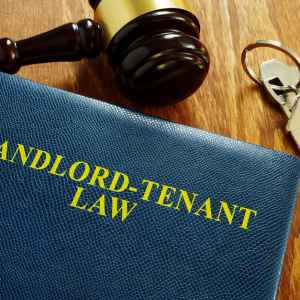
In Texas, when a tenant abandons a property, it’s crucial to understand how to manage the situation in line with local property laws. Protect your rights and assets by following the Texas tenant abandonment guidelines as part of Ready House Buyer’s process.
What Does Texas’ Definition of Tenant Abandonment Mean in Terms of Legal Abandonment?
It’s critical for landlords to understand the definition of tenant abandonment in Texas. If a tenant vacates a property without informing the landlord and ceases to pay rent, the property is deemed abandoned under Texas’s tenant abandonment laws. Abandonment indicators could include:
- The tenant’s personal things are gone.
- The tenant doesn’t reply to your calls or messages.
- The rent hasn’t been paid for the time mentioned in the rental agreement.
To find out if it’s legally abandoned, make sure to review the lease and the Texas property code. This ensures that you abide by the law and safeguards your rights.
First Things First When Tenant Abandonment Is Found: Protecting the Property

In Texas, landlords must take prompt, lawful action if a tenant vacates their property. What to do next is as follows:
- Secure the Rental Property: By locking all windows and doors to prevent unauthorized individuals from entering.
- Notify Authorities: Inform the appropriate authorities, particularly if there are any indications of vandalism or foul play.
- Review the Property Code: To learn about landlord rights and tenant abandonment, review the Texas Property Code.
- Issue an Eviction Notice: To protect yourself, if necessary, send an eviction notice in accordance with the law.
Managing properties according to legal requirements is crucial. Keep a record of all actions you take.
Legally Accessing the Abandoned Property: Procedures for Entry & Documentation
To get into an abandoned property legally, follow these steps:
- Verify Abandonment: Check for signs like unread mail or ignored maintenance requests to confirm tenant abandonment in Texas.
- Record Everything: Take pictures of the state of the property. If there are any legal disputes, this can be useful.
- Observe Legal Entry Procedures: Make sure you are adhering to the Texas property code before entering the property.
- Consult a Law Library: If the situation is complicated, look into resources such as a law library for additional information on eviction and landlord rights.
- Maintain Communication Records: Save any emails or letters you send to the tenant about your concerns about their potential abandonment.
By taking these actions, landlords can manage cases of abandonment while preserving their legal rights. Get in touch with experts who are knowledgeable about tenant laws if you need assistance or have questions.
Legal Processes for Recovering Your Texas Property Following Tenant Abandonment
Appropriate Notice Requirements for Serving an Eviction Notice in a Tenant Abandonment Case
When serving an eviction notice in Texas, landlords are required to adhere to the Texas Property Code. This aids in defending the rights of both landlords and tenants. Here’s how to do it easily:
- Eviction Notice: Clearly say why you are evicting, like tenant abandonment.
- Proper Delivery: Give the notice directly to the tenant or put it on the rental property’s door.
- Court Involvement: If the tenant doesn’t respond, file for an eviction hearing in court.
These steps help landlords follow the law and avoid problems.
Handling Abandoned Tenant Belongings: Legal Procedures & Responsibilities
When tenants leave things behind, landlords have rules to follow in Texas:
- Storage Obligations: Keep abandoned tenant property safe from damage.
- Notification: Tell the tenant about their belongings. Let them know how long they have to get them back.
- Legal Compliance: Follow local property rules to avoid getting into trouble.
By doing these things, landlords can protect themselves and respect tenant rights.
Legal Implications of Disposing of Abandoned Property: Avoiding Legal Pitfalls
Throwing away abandoned property without following Texas rental laws can cause big legal troubles:
- Legal Disposal: Make sure the tenant has given up property rights before throwing anything out.
- Landlord Rights: Be aware of your rights to prevent legal action or fines.
- Preventing Liability: Document your actions regarding vacant property to demonstrate that you complied with Texas rental regulations.
In order to comply with the law, landlords must take care when handling these procedures. Get in touch with Ready House Buyer if you require additional assistance regarding tenant abandonment.
Handling Texas’s Unpaid Rent and Utilities Following Tenant Abandonment
Taking Legal Action to Recover Unpaid Rent: Documentation & Court Processes
Landlords may be responsible for unpaid rent if a tenant vacates their rental property. This is what you must do:
- Lease Agreement: Review the lease to understand the responsibilities of the tenant and your rights as the landlord. Your primary document for any legal action is this one.
- Court Procedures: To recover unpaid rent, you may file a lawsuit in small claims court. Gather all pertinent documents, including the lease, records of rent payments, and correspondence with the tenant.
- Security Deposit: The security deposit may be applied to the amount of unpaid rent. However, keep in mind that it might not pay for everything they owe.
- Legal Protections: To avoid violating any tenant’s rights, abide by all Texas laws.
Managing Past-Due Utility Bills: Accountability & Legal Defenses

Landlords may be left with unpaid utility bills from abandoned properties. Here’s how to determine the payer:
- Responsibilities: Examine the lease to determine whether the renter was expected to cover utility costs. If so, they are still responsible for any outstanding bills.
- Legal Protections: To assist landlords in handling these matters, the Texas Property Code provides a number of guidelines and protections.
- Obligations: Be aware of what the law requires of you in order to prevent unfair charges or fines.
Potential Legal Consequences of Improper Handling: Avoiding Lawsuits & Penalties
It’s important for landlords to handle tenant abandonment the right way to avoid legal trouble.
- Penalties and Lawsuits: If you mess up, like by taking a tenant’s things wrongly, you could face fines or lawsuits. Landlords need to know tenant rights to not get in trouble.
- Avoidance: Talk to a lawyer to follow all laws and rules. This helps you avoid expensive legal fights.
- Tenant’s Rights: Learn about tenant rights, like giving notice before eviction and handling their security deposit right.
Landlords can better handle unpaid rent and utilities after a tenant vacates by being aware of these factors. Get advice from Ready House Buyer if you have any questions or need more assistance.
Reselling Your Texas Home After Abandonment: Reducing Damages & Avoiding Further Problems
Preventing Vacancy-Related Losses: Techniques to Lessen the Financial Impact
It can be difficult to own a rental property in Texas, particularly if a tenant vacates without warning. Landlords can lessen the loss from an empty property in the following ways:
- Property management: Communicate with renters and respond promptly to their needs. Tenants who are satisfied are less likely to vacate.
- Tenant Screening: Landlords can better handle unpaid rent and utilities after a tenant vacates by being aware of these factors. Get advice from Ready House Buyer if you have any questions or need more assistance.
- Reselling Your Texas Home After Abandonment: Reducing Damages & Avoiding Further Problems
- Preventing Vacancy-Related Losses: Techniques to Lessen the Financial Impact
It can be difficult to own a rental property in Texas, particularly if a tenant vacates without warning. Landlords can lessen the loss from an empty property in the following ways.
Legal Requirements & Best Practices for Required Repairs & Cleaning Before Releasing
Make sure your property is in good condition before renting it out again. To comply with legal requirements and draw in new tenants, take the following actions:
- Property Inspection: Take a close look at the property to identify any necessary damage or repairs.
- Repairs and Maintenance: Fix things like plumbing or electrical issues right away. Make sure all work follows Texas housing rules.
- Cleaning: Hire a cleaning service to make the place look nice and clean.
- Tenant Rights: Respect the rights of tenants during repairs to avoid extra costs or legal problems.
Doing these things will help you meet legal standards and make the property more appealing.
Preventing Future Tenant Abandonment Issues: Effective Tenant Screening & Lease Agreements
To avoid problems with tenants leaving, focus on good screening and strong lease agreements:
- Extensive Tenant Screening: Perform comprehensive background investigations, encompassing credit and rental history. This aids in selecting trustworthy tenants.
- Clear Lease Agreements: Write lease terms that are simple to comprehend. Describe how evictions operate, who fixes what, and how rent is paid.
- Communication: Have frank discussions with tenants to resolve issues before they become serious ones.
- Regular Inspections: To identify and address issues early, inspect the property on a regular basis.
Using these smart steps will help keep good tenants and maintain a stable rental property in Texas.
Addressing Property Damage After Tenant Abandonment in Texas: Legal Recourse
Proving Tenant Responsibility for Damages: Gathering Evidence & Documentation
When a tenant leaves a property in Texas without notice and causes damage, landlords need to show the tenant is responsible. Here’s how you can do it:
- Take Pictures of Everything: Take crisp pictures of any damage as soon as possible. Verify that timestamps are included in the photos.
- Maintain Receipts and Estimates: Keep track of all maintenance and repair receipts. To find out how much the repairs will cost, ask contractors for estimates.
- Communication Documentation: Maintain a log of all correspondence with the tenant. Letters and emails regarding their duties fall under this category.
- Legal Documentation: Maintain a copy of the lease and any notices you sent regarding property maintenance as legal documentation.
If you have to appear in court, these actions can help support your case.
Filing a Lawsuit to Recover Damages: Legal Procedures & Court Process
You may have to go to court if the tenant refuses to pay for the repairs. The legal steps should be handled as follows:
- Speak with an attorney: Speak with a lawyer knowledgeable about landlord-tenant matters and the Texas Property Code.
- File the Complaint: Submit a complaint to the court to begin the legal action. Evidence and an explanation of the damages should be included in the complaint.
- Court Procedure: Attend hearings and present supporting documentation, such as photographs and repair invoices.
- Request Judgment: Your case will be reviewed by the court. They might mandate that the renter cover damages if they agree.
- Enforce the Judgment: You may require additional legal assistance to collect the money if the tenant continues to fail to pay.
Knowing these steps can help you get ready if you have to take legal action.
Legal Resources for Texas Landlords: Organizations & Attorney Referrals & Ready House Buyer’s Assistance

Landlords in Texas dealing with tenant abandonment can find help with these resources:
- Legal Aid Organizations: These groups offer free or cheap legal advice for landlords dealing with property disputes and eviction.
- Attorney Referrals: Local bar associations can help you find lawyers who specialize in landlord-tenant law.
- Landlord Rights Groups: Join groups that focus on protecting landlord rights to learn about the latest laws and good practices.
- Ready House Buyer Assistance: Our group, Ready House Buyer, offers advice and support to landlords managing abandoned properties, helping them make smart choices.
Landlords can manage property damage issues and protect their investments by using these resources.
FAQS
In Texas, what should a landlord do if a tenant vacates the property?
Make sure to look for any unpaid rent or leftover items if a tenant vacates the property without warning. Make notes and take pictures to record everything. Examine the lease and the laws pertaining to abandoned properties in Texas. Notify the last known address of the tenant. Consult a lawyer if you’re not sure what to do next.
How can landlords handle personal belongings left by tenants?
Texas law says landlords can store items left behind when a tenant leaves. Make a list of these items and keep them safe. Tell the tenant where to pick up their things and give them a deadline. If they don’t claim their stuff, you might be able to sell or throw them away, but check with a lawyer first.
What legal responsibilities do Texas landlords have when it comes to tenant abandonment?
In Texas, if a tenant vacates a property, the landlord is required to abide by state law. This entails handling unpaid rent in accordance with the regulations and appropriately storing any items that are left behind. Look at the lease for any special terms related to this. It’s wise to get a lawyer’s help to ensure you’re following the law.
Can a landlord in Texas remove abandoned property without notice?
No, Texas landlords have to notify the tenant before touching abandoned property. Use mail or another way that’s documented, and give the tenant time to get their things. Always check Texas laws or ask a lawyer for advice.
What options do landlords have if a tenant leaves without paying rent?
Use a collection agency or file a small claims lawsuit if a tenant vacates the property without paying rent. You can also use the security deposit to cover what is owed. Make sure to keep records of all communications and payments. A lawyer can help you understand your options. Or, if you’re looking for a quick solution, you can sell your home for cash in Dallas or nearby areas.
What impact does a tenant’s departure have on a landlord’s liability in Texas?
When a tenant leaves, a landlord has to deal with security deposits, property care, and tenant items. They need to follow the steps for storage and let the tenant know about their stuff to avoid problems. Knowing Texas laws helps landlords handle these cases without legal trouble.
What actions should Investors take if multiple tenants abandon investments at once?
Plan of action for tenant abandonments should be in place, regardless of the situation. Maintaining proper communication and records, as well as consulting a lawyer, makes this process easier. Update leases so they easily mitigate these challenges. Or, if you’re looking for a quick solution, you can sell your home to investor home buyers in Austin or nearby areas.
Are there specific city guidelines for tenant abandonment in major Texas cities like Austin or Houston?
Texas has state laws about tenant abandonment, but cities like Austin and Houston might have extra rules. Landlords should learn these local rules to stay legal. Local realtors or lawyers can help with understanding city-specific rules.
Key Insights
- Understanding the law Texas housing has is essential in dealing with tenant’s abandonment as there are step-by-step procedures set in place to follow appropriately while handling property abandonment in Texas.
- If a tenant leaves a property behind, learn about Texas landlord rights and tenant’s rights in Texas to ensure you follow the law.
- For landlords with tenant issues in Texas, knowing how to manage tenant abandonment can help avoid problems and liabilities.
- In cases of rental property abandonment in Texas, check out Texas tenant abandonment laws to see what you can do about unpaid rent and any belongings left behind.
- Comprehend what should be done when a tenant leaves or vacates so that your property can be managed smoothly.
- Learn about the Texas eviction process and follow Texas property management rules for handling vacancies correctly.
- Familiarize yourself with the Texas eviction process and adhere to the rules for Texas property management concerning separated or vacant spaces in the property.
- Think about what might happen if someone abandons a property in places like Austin, Dallas, or Houston.
- Set clear lease terms and talk to tenants about what you expect. This can help prevent issues if someone abandons the property.
- Stay updated on Texas real estate trends so you can adapt to changes in housing laws and tenant management.
- If a tenant abandons property, decide whether belongings left behind need storing or throwing away as per Texas property code.
- Get legal advice if you’re not sure about what to do with abandoned property or if facing an eviction.
- Use online resources or expert advice to learn more about Texas tenant abandonment and property management.
- Screen tenants carefully to reduce the chance of abandonment and protect your investment.
- For landlords in Texas, knowing your legal duties and how to deal with tenants is important for managing property well.
Need to sell your home? Ready House Buyer makes it easy with fair cash offers, no repairs needed, and a hassle-free process. Ready to sell or have questions? Contact us at (214) 225-3038 for a no-obligation offer. Get started today!
